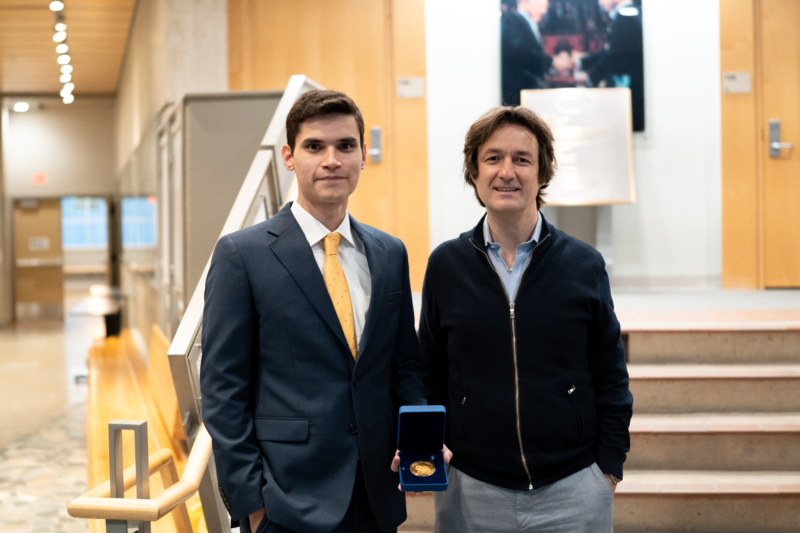Awards and recognition
MSL graduate receives Governor General’s Gold Medal: Q&A with Jorge Holguín Cruz
We are excited to extend our congratulations to Jorge Holguín Cruz, a recent Master’s graduate from the lab of Dr. Jörg Gsponer (Michael Smith Laboratories, Department of Biochemistry and Molecular Biology), for receiving the UBC Governor General’s Gold Medal.
Each year, one medal is presented to the Master’s student with the most outstanding academic record during their studies in a thesis-based program. With the medal going to one of over 2,000 graduate students, this prominent award recognizes Holguín Cruz’s hard work and dedication to his studies while completing his Master of Science in Bioinformatics. He was presented the medal at his convocation ceremony on November 29, 2024.
“I am very grateful to have received recognition with the Governor General’s Gold Medal. It has been a great boost to my motivation to pursue a career in science,” shares Holguín Cruz.
Holguín Cruz now works as a Computational Biologist at Canada’s Michael Smith Genome Sciences Centre. We asked him to speak with us about his research, his master’s experience, and what’s next for him.

Jorge Holguín Cruz (left) and Dr. Jörg Gsponer (right)
What was the focus of your Master’s research?
My research sought to understand the impact of cancer mutations on protein autoinhibition, a mechanism that allows proteins to regulate their own activity so they are only active in the right contexts.
From previous studies we knew that mutations that alter protein autoinhibition can promote and maintain cancer, but collectively those studies had only looked at a small subset of proteins. Our goal was to study a much larger set of proteins, and then integrate that information with data from seven large-scale cancer sequencing projects and gene expression data. We hoped to understand whether mutations that disrupt protein autoinhibition are widespread in cancer, and to understand the gene expression changes associated with these mutations. Based on those findings, we selected a few specific mutations in two proteins to study how they alter protein autoinhibition using molecular dynamics simulations.
Why were you interested in pursuing this area of research?
My initial inspiration for this research came from a desire to learn how to use and write computer code for exploring biological systems and investigating protein structures. From undergraduate lectures I attended taught by Dr. Gsponer, it became clear that his lab would be an ideal place to do this, so I reached out to join his lab during my undergrad and then stayed on for my master’s.
What is the potential impact of this research?
One of our analyses demonstrated that proteins with large numbers of mutations in their autoinhibitory regions are strongly associated with cancer. This motivated us to look for mutations within these regions in proteins with a weaker association with cancer, to help identify whether these proteins do actually have the potential to drive cancer.
In the particular case of the catalytic subunit of calcineurin (a phosphatase), we found an enrichment of mutations inside its autoinhibitory helix, but the association of this protein with cancer had not been well characterized. Our gene expression and molecular dynamics analyses both pointed to the potential of these mutations to result in the protein’s overactivation, which provides some preliminary evidence for the importance of these mutations in cancer. Further studies will hopefully help to verify these findings towards identifying a potential pathway for targeting cancer.
What was the most memorable, rewarding, or challenging part of your Master’s studies?
Before joining the Gsponer lab, my research experiences had all been in wet labs, so I lacked a foundation of computational knowledge. Building that foundation as I went through the master’s was probably the most challenging part. It has, though, been very rewarding looking back at what I accomplished during my master’s with Dr. Gsponer’s guidance and with the help of other lab members.
What’s next for you?
My hope is to pursue a PhD in the not-so-distant future. I am motivated to learn new skills that allow me to understand biological systems at a large scale, and look forward to doing so through further studies.
Quick links
- Learn more about the Gsponer lab
- Read Holguín Cruz’s paper: Widespread alteration of protein autoinhibition in human cancers
- Read Holguín Cruz’s paper: Where protein structure and cell diversity meet